|
Jakob Böhmeaka Jakob Boehme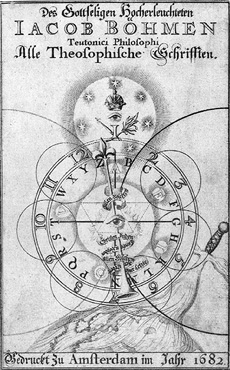 You are sitting in front of a computer that would have filled a skyscraper had it been built in 1956. You have terabytes of the world's accumulated wisdom at your fingertips via Google. You have a college education in your pocket. Einstein, Feynman, Gödel, Jung, the Wachowski Brothers, Turing, Fermi, Crick and Watson have all blazed an intellectual trail for you to follow. With all this going for you, your major contribution to society so far consists of a message board post theorizing that the castaways on Lost might be in Purgatory.
You are sitting in front of a computer that would have filled a skyscraper had it been built in 1956. You have terabytes of the world's accumulated wisdom at your fingertips via Google. You have a college education in your pocket. Einstein, Feynman, Gödel, Jung, the Wachowski Brothers, Turing, Fermi, Crick and Watson have all blazed an intellectual trail for you to follow. With all this going for you, your major contribution to society so far consists of a message board post theorizing that the castaways on Lost might be in Purgatory.
Clearly, someone's been slacking off. It all started one day around 1610; a young German shoemaker was looking at a pewter dish when a dazzling ray of reflected sunlight unexpectedly turned out to be a message from God. Many people receive messages from God. However, these usually tend to run along the lines of "Kill! Kill! Kill!" Such messages are not particularly interesting unless you happen to be on wrong end of the ax.
Böhme wrote about his experience and the strange thoughts which resulted, but he sensibly decided to keep these notions within his circle of close friends. His friends had different ideas and copied Böhme's manuscript without his permission, circulating it around the prominent intellectual circles of the day. Böhme became a celebrity overnight -- which was not a good thing. The local religious authorities were not amused. Luckily for Böhme, he was a Protestant and not a Catholic, so he was simply threatened with exile instead of having large spikes shoved up his ass. Inconveniently, the visions kept coming. Although he was initially deterred by the threats of the local pastor, Böhme eventually began to write again, at first in secret and later in a handful of books. The majority of his work was not published until after his death.
All the controversy took a toll on his health, and Böhme died at the age of 49. But his ideas would live on, helping to shape a vast lineage of occultists, philosophers and lunatics for centuries to come. Böhme treatises were mostly Gnostic and kabbalistic in nature. His concepts often reflected Eastern spiritual concepts that were not widely known in Germany at the time. Böhme began with a radical rethink of the traditional Judeo-Christian God. He threw out the traditional picture of a guy with a beard and long robes in favor of an abstract, formless deity. Prior to the creation of man, Böhme wrote, God was an undifferentiated single unity defined by the absence of everything else -- the Abyss, or "Ungrund." Creation was the result of the Ungrund dividing from its state of original unity -- a proposition completely familiar to Taoists but foreign and offensive to Böhme's fellow Lutherans.
To initiate this learning process, God rendered Himself into positive and negative aspects -- yin and yang to the Taoists, although the material substance of Böhme's universe is not itself synonymous with God. Prior to the initial split, God was only a potential mind with an unformed longing to know itself. After the split, God iterated into a binary-based matrix, continually increasing in complexity as He collected more and more information about Himself. In other words, Böhme's God evolves with the passage of time, in sharp contrast to the traditional Judeo-Christian view of a perfect, complete and unchanging figure who exists outside the normal flow of time.
The tension between God's positive and negative aspects boils down to an identity crisis -- cosmic self-loathing. The positive force is the part of God that chose to differentiate itself in search of self-knowledge; the negative force is the part of God that seeks to return to its original unified state (obliterating reality in the process). Böhme characterized this negative force as "divine wrath," the eternal frustration of seeking a goal that can never be accomplished. In Böhme's cosmology, the wrathful element of God as the Father, the beneficient element as Jesus Christ, the Son. The syzygy of the conflict between the opposite poles created a process of change -- the Holy Spirit, as the continual interaction of the Father and Son through time.
Böhme expanded on these thoughts to develop theoretical frameworks encompassing virtually every aspect of the Christian mystical experience, covering everything from Sacred Geometry to the book of Genesis to the nature of Satan, the angels and the Antichrist. With the basic underlying premise of creation firmly in hand, Böhme turned his attention to the details, integrating concepts from the Kabbalah and alchemy, and laying out a foundation for scientific and especially philosophical thought that exerted a wide-ranging influence on the elite minds of the Enlightenment (although the controversial nature of his assertions often kept that influence below the radar). Böhme's work reflected so many diverse spiritual concepts that he is considered to be the father of Theosophy -- a precursor to the New Age movement which stipulates that all religions are basically talking about the same thing in different words.
On the more disreputable end of the spectrum, Böhme was probably the single largest influence on the founders of modern occultism, including Aleister Crowley, Madame Blavatsky, and Adam Weishaupt, founder of the Illuminati, who got a lot of mileage out of Böhme's trademark imagery, including the famed "Illuminati eye" and the Ouroboros. Small groups of adherents began to spring up. These early groups formed first among the Rosicrucians (a secret society active during Böhme's lifetime that was a precursor to modern Freemasonry) and a few small groups which, inspired by Böhme's tale of illumination in a ray of sunlight, began to refer to themselves as the Illuminati. Later, Weishaupt's Bavarian Illuminati would adopt some of Böhme's principles in their quest to rule the world -- a purpose Böhme himself would have found laughable.
|
 About 400 years ago, before the discovery of electricity and only 150 years after the invention of the printing press, a barely literate German cobbler came up with the idea that God was a binary, fractal, self-replicating algorithm and that the universe was a genetic matrix resulting from the existential tension created by His desire for self-knowledge.
About 400 years ago, before the discovery of electricity and only 150 years after the invention of the printing press, a barely literate German cobbler came up with the idea that God was a binary, fractal, self-replicating algorithm and that the universe was a genetic matrix resulting from the existential tension created by His desire for self-knowledge. 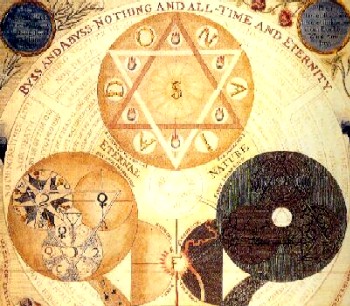 Jakob Böhme's transmission was considerably deeper than the usual psychotic imperative. In fact, his vision (well, let's call it that) contained profound theological insights well beyond his educational level, which amounted to little more than Bible study and sole-cobbling techniques.
Jakob Böhme's transmission was considerably deeper than the usual psychotic imperative. In fact, his vision (well, let's call it that) contained profound theological insights well beyond his educational level, which amounted to little more than Bible study and sole-cobbling techniques. 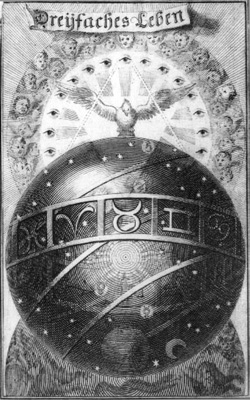 His ideas were radical and exciting, and Böhme began to attract adherents -- which again led to trouble. His radical and exciting
His ideas were radical and exciting, and Böhme began to attract adherents -- which again led to trouble. His radical and exciting 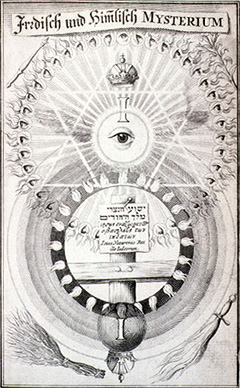 Even more controversially, Böhme argued that God could not be omniscient and omnipotent, since He was eternal and unique. "He knows no beginning, and also nothing like Himself, and also no end," Böhme wrote, arguing that God created man in His own image so that He could learn about Himself.
Even more controversially, Böhme argued that God could not be omniscient and omnipotent, since He was eternal and unique. "He knows no beginning, and also nothing like Himself, and also no end," Böhme wrote, arguing that God created man in His own image so that He could learn about Himself. 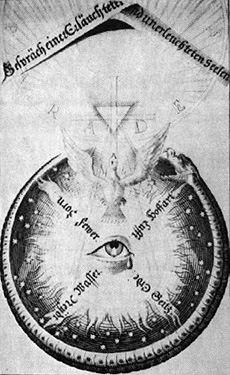 The positive and negative aspects of creation were necessarily opposed to each other, and Böhme believed that this conflict was at the heart of the universe's logic and all of its processes. Since this tension is inherent to the design of all reality, evil and suffering are a necessary part of reality -- and both originate with God.
The positive and negative aspects of creation were necessarily opposed to each other, and Böhme believed that this conflict was at the heart of the universe's logic and all of its processes. Since this tension is inherent to the design of all reality, evil and suffering are a necessary part of reality -- and both originate with God. 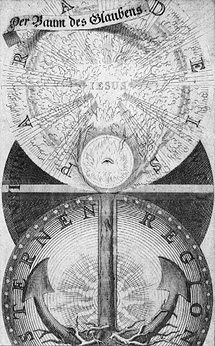 Böhme presented the universe as the product of the dueling forces of Father and Son, one bent on disordering and a return to unity (entropy), the other bent on ordering and harmonizing in the process of differentiation (organization), a formula now understood to foreshadow key concepts in chaos theory and genetic sequencing. The human body and
Böhme presented the universe as the product of the dueling forces of Father and Son, one bent on disordering and a return to unity (entropy), the other bent on ordering and harmonizing in the process of differentiation (organization), a formula now understood to foreshadow key concepts in chaos theory and genetic sequencing. The human body and 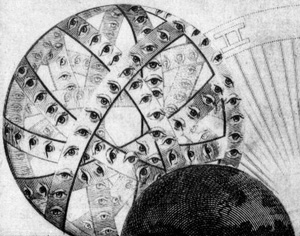 After his death, Böhme's writings were quietly circulated among the elite minds of Europe. His ideas were pursued by everyone from
After his death, Böhme's writings were quietly circulated among the elite minds of Europe. His ideas were pursued by everyone from